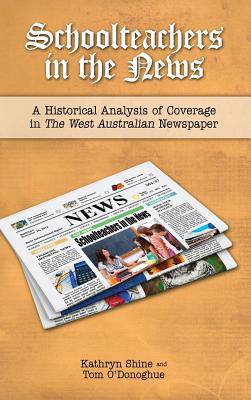
- Retrait gratuit dans votre magasin Club
- 7.000.000 titres dans notre catalogue
- Payer en toute sécurité
- Toujours un magasin près de chez vous
- Retrait gratuit dans votre magasin Club
- 7.000.0000 titres dans notre catalogue
- Payer en toute sécurité
- Toujours un magasin près de chez vous
Schoolteachers in the News
A Historical Analysis of Coverage in the West Australian Newspaper
Kathryn Shine, O'Donoghue
Livre relié | Anglais
177,45 €
+ 354 points
Description
Research examining how schoolteachers have been represented in the news is scarce. This is noteworthy, given the recognition that the news media has an influential agenda-setting function, plays a pivotal role in shaping public opinion, and can influence educational policy. Indeed, there is a view amongst some authorities that education policy and news media coverage are irrevocably interconnected. In addition to the widespread concern about the decline in the status of teaching, many countries are experiencing ongoing teacher recruitment and retention problems. Despite this, very few studies have considered how schoolteachers and teaching as a profession are depicted in the news media. Particularly scarce are investigations with a historical dimension. This book helps fill the gap by examining the reporting in The West Australian newspaper, one of the oldest newspapers in Australia and a daily publication since 1885. It is offered as a contribution towards rectifying the deficit in the corpus of work on how newspapers have depicted teachers and points the way towards one of a number of avenues of research that other scholars in the field could take for various contexts (including different countries) and time periods. Overall, the book highlights the need for key media spokespeople in education--politicians, union representatives, bureaucrats and academics--to consider carefully the messages they want to send regarding teachers and teaching. It also points to implications for journalism education and journalism practice. This book should be read by those working in the fields of educational policy, journalism education, media studies, and history of education internationally, particularly those working in these fields in the United States, Canada, the United Kingdom, Australia, and New Zealand.
Spécifications
Parties prenantes
- Auteur(s) :
- Editeur:
Contenu
- Nombre de pages :
- 272
- Langue:
- Anglais
Caractéristiques
- EAN:
- 9781604978339
- Date de parution :
- 28-02-13
- Format:
- Livre relié
- Format numérique:
- Genaaid
- Dimensions :
- 152 mm x 229 mm
- Poids :
- 566 g

Les avis
Nous publions uniquement les avis qui respectent les conditions requises. Consultez nos conditions pour les avis.






